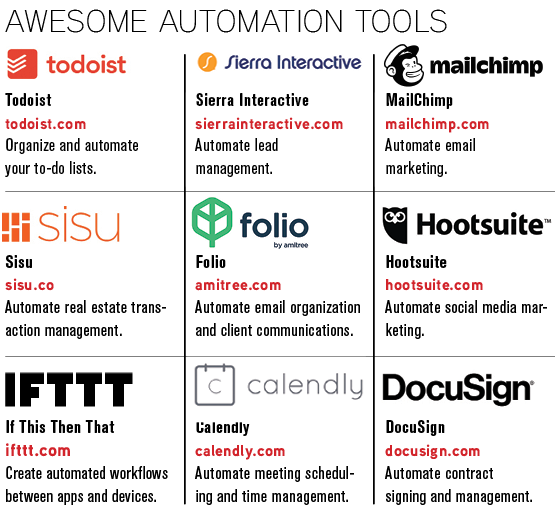Automating tedious tasks can free up more time for agents to interact and connect with clients
By Matt Alderton
The robot revolution has begun, and there’s no stopping it now. In fact, almost half of today’s work activities could be automated by 2055, according to global consulting firm McKinsey & Company.
In real estate, automation represents both a threat and an opportunity. On one hand, startups like REX want to automate real estate transactions in ways that replace human REALTORS®. Yet on the other hand, REALTORS® are subjugating the very weapon that’s being used against them, reclaiming it in ways that might actually make them more resilient to its assaults.
REALTOR® Mike DelRose Jr. explains. “There’s a lot of fear about industries fully automating and kicking workers to the curb, but real estate is one of those industries that needs a human-to-human connection,” says DelRose, director of marketing for The Mike DelRose Team, a RE/MAX Revolution office in Watertown, Massachusetts. “Buyers and sellers can be very emotional beings, and they want a human in the loop to advise them. So in my opinion, REALTORS® aren’t going to be automated out of a job. But we can use automation to streamline day-to-day processes in ways that free us up to do what we’re best at, which is interacting with people.”
Simply put: If you want to protect your business from automation, perhaps the best thing you can do is embrace it.
Automation essentials
Automation is a means to an end—and that end is speed.
“Automation is having a process that allows routine things to be done more quickly,” explains productivity consultant Frank Buck of Pell City, Alabama. “Even before the days of technology, people sat down and thought about the things they did every day, every week or every month, and came up with processes that allowed them to do those things very quickly. That’s automation.”
Echoes Ben Heinrich, CRS, broker associate at The Heinrich Team, Coldwell Banker office in Carmel, California, “‘Automation’ comes from the term ‘automatic.’ It’s about breaking a process down into steps, and automatically moving through those steps when a given situation comes up.”
A self-described “analog head,” Heinrich’s favorite automation tool is the humble checklist. “We have a checklist for everything,” he says. “For example, if we have a price reduction, there’s a price reduction checklist that reminds us of everything we have to do, from alerting people who have seen the property to changing brochures and updating the MLS.”
Checklists allow Heinrich’s team to cruise through routine tasks quickly and error-free so they can spend more time on relationship management, problem solving and other strategic tasks.
Buck also likes checklists, but favors the digital variety. “With a digital task manager, you don’t have to constantly write and rewrite your list,” Buck says. “What doesn’t get done today automatically rolls over to tomorrow, and tasks that you repeat at the same time every day, week, month or year automatically show up when you need to do them.”
Masterful marketing
Although you can achieve basic automation without it, technology can enhance your automation game. One of the areas in which it can be most impactful, for example, is marketing and communications.
“It used to be that every time an agent wanted to reach out and touch base with a client, they had to do so manually, and one at a time,” explains Christopher Linsell, an analyst for TheClose.com, a real estate website. Now, he says, agents using CRM solutions can automate emails, texts and even voicemails to stay in touch with clients and prospects.
REALTOR® Ricky Cain, CRS, uses a CRM not only to connect with prospective clients, but also with prospective agents to join his team: When someone in his region applies for their real estate license, his staff adds them to their CRM and initiates a 12-week cycle of automated communications whose purpose is getting new talent to inquire about employment opportunities.
“My local talent market is highly competitive; to get the best people, you have to go above and beyond,” says Cain, director of growth at Cain Realty Group in Austin, Texas, which also automates social media marketing. “We use Hootsuite to build out an entire week’s worth of marketing so that information can flow out on social media in an automated way—even on the weekends—without someone having to be online to actually post it.”
Superior service
REALTORS® can also use automation to help improve customer service. Buck, for example, suggests using the in-email meeting scheduler Assistant.to to streamline scheduling, Gmail Templates to create and send pre-written emails that quickly answer frequently asked questions, and Gmail’s Priority Inbox feature to automatically separate important emails from junk.
Probably the biggest customer service opportunity, however, exists in the area of transaction management. “After a contract has been secured for the purchase or sale of a property, the process of finalizing the transaction begins, including property inspection, appraisal, loan approval, title search and closing, just to name the major steps. This string of events is notoriously laborious,” Linsell explains. “Transaction management platforms automate the important communication to make sure transactions are staying on track and to nudge slow parties to deliver on their requirements.”
Cain uses the growth automation platform Sisu alongside the transaction management solution Folio. The former automatically sends agents and account managers notifications at every stage of a transaction, prompting them to input dates and details that keep the process moving in an automated fashion. Simultaneously, the latter sends automated communications to clients, who can view a transaction timeline to see what tasks have been completed and which ones are yet to come.
“In my experience, the biggest customer-service opportunity for real estate agents is to explain to a client what happens next,” Cain says. “What’s nice about the way we’ve automated our systems is that the client always sees what’s around the corner.”
DelRose wants to automate the front end of transactions. He’s therefore part of a team that’s building a new platform that will automate the initial work of onboarding new buyer clients. “It uses AI and machine learning to break down a home’s cost for your lifestyle, which allows you to search for homes via monthly payment instead of listing price,” explains DelRose, whose custom platform uses big data—detailed information about clients’ monthly spending, for example—to calculate a personalized home-search budget that clients eventually will be able to share directly with lenders in order to get pre-approved for a mortgage. “Because you’re only seeing houses you can afford, you’re eliminating this huge amount of time between starting your search online, meeting with a lender, and then going out and seeing houses.”
DelRose has similarly streamlined onboarding by putting his listing presentations into video format. “When I have consultations with buyers and sellers, they typically have 100 questions,” he says. “If I can answer those questions more efficiently using something like a video, that saves a lot of time.”
Whether you use it to simplify marketing, communication or transaction management, the benefit of automation isn’t time savings in and of itself. Rather, it’s what you do with the time you save.
“If you’re trying to do 100 sales a year, you have to eliminate time-consuming tasks while still providing incredible service,” DelRose concludes. “Automation is how you do that.”

Just as your business can be automated, homes can, too. Get smart home certified at CRS.com/learn/certifications/smart-home-certification.








